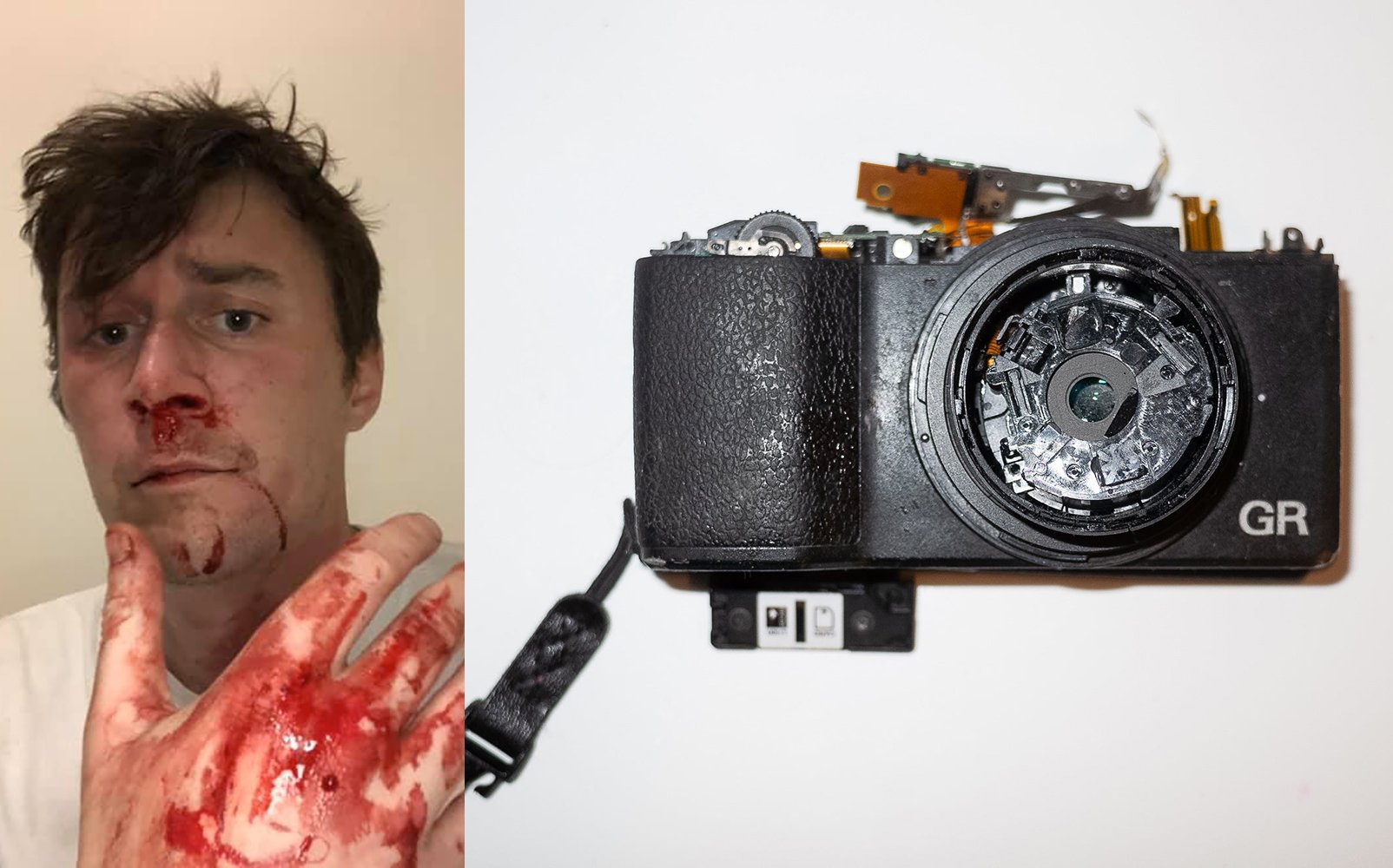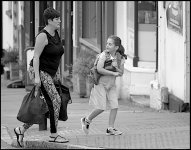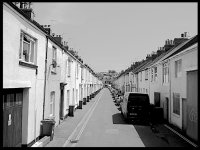and the site receives a small commission
You are using an out of date browser. It may not display this or other websites correctly.
You should upgrade or use an alternative browser.
You should upgrade or use an alternative browser.
Street Photography Series Explores the Urge to Take Photos of Strangers
- Thread starter garryknight
- Start date
- Messages
- 2,854
- Name
- Chris
- Edit My Images
- Yes
I’m keen to see more of the series. I like to take non person identifying street pictures, you know light and shade, shadow and reflection, shape and negative space pictures but don’t get the motive for a pre planned hastily taken snaps right in the face of someone. Each to their own and understanding what rules and morals you have seems key to me - I have learnt about myself and no longer take anything that could cause any pain to anyone. I’m not and have no desire to document news and certainly don’t think I’d react well to someone leaping up and clicking in my face and running off in denial so have no desire to do that to someone else.
- Messages
- 9,248
- Edit My Images
- No
...but don’t get the motive for a pre planned hastily taken snaps right in the face of someone.
I agree with both those points....and certainly don’t think I’d react well to someone leaping up and clicking in my face and running off in denial so have no desire to do that to someone else.
- Messages
- 288
- Name
- daniel
- Edit My Images
- Yes
This episode might appeal to you, Andrew. I really enjoyed it and thought his photographs are great.
View: https://www.youtube.com/watch?v=t6037zOMru0
- Messages
- 2,249
- Name
- Lee
- Edit My Images
- No
That's you. How do you know what your victim will feel?
I try to behave like a wildlife photographer and for the same reason a wildlife photographer behaves that way: to record how the subject behaves without the photographer's interference.
Good street photography is not using telephoto lenses and acting like a wildlife photographer. Your mindset is all wrong.
If you knew anything about the subject and studied the likes of Garry Winogrand, Joel Meyerowitz, Lee Friedlander, Tony Ray Jones, Martin Parr and many others you'd understand that getting closer is what provides the emotion, the drama, the energy, the intimacy, or the comedy of a photo. Street photography is not about being rude and trying to upset people but you need to understand that to get compelling photos you have to get close and sometimes even a little in people faces. We try to avoid confrontation but now and again it happens to both us and the masters, it's simply part of the territory.
- Messages
- 9,248
- Edit My Images
- No
My mindset is perfectly correct for me.Good street photography is not using telephoto lenses and acting like a wildlife photographer. Your mindset is all wrong.
Fair point, I've only been making photographs since 1967 so what would I know about the subject?If you knew anything about the subject
So it's fine to annoy or alarm others in order to take a picture?We try to avoid confrontation but now and again it happens to both us and the masters, it's simply part of the territory.
That is what I would call a foolish attitude.
Last edited:
- Messages
- 5,330
- Name
- Peter
- Edit My Images
- Yes
yes it's very good. He has great people skills.This episode might appeal to you, Andrew. I really enjoyed it and thought his photographs are great.
View: https://www.youtube.com/watch?v=t6037zOMru0
- Messages
- 2,249
- Name
- Lee
- Edit My Images
- No
My mindset is perfectly correct for me.
Fair point, I've only been making photographs since 1967 so what would I know about the subject?
So it's fine to annoy or alarm others in order to take a picture?
That is what I would call a foolish attitude.
I've no doubt your mindset is correct for you, but it's definitely not for street photography.
Taking photographs since 1967 doesn't qualify you as a knowledge on street photography, particularly given the way you've expressed your views on how you think it should and shouldn't be done. However, I'm sure you're excellent in landscape, architecture or any other genre of photography that you've done a lot of.
The only people alarming others are those doing a Bruce Gilden flash right in your face style. And whilst that is an aggressive and risky way of getting a picture, and not my style of shooting either, a lot of his work is undeniably compelling to look at. Most street photographers including myself shoot a subject around 6 to 8 feet away and most subjects aren't 'victims' and they barely notice most of the time. I use flash a lot too.
- Messages
- 9,248
- Edit My Images
- No
A photograph taken in the street or of the street is, by definition, "street photography".I've no doubt your mindset is correct for you, but it's definitely not for street photography.
Did I not say "so what would I know about the subject?"Taking photographs since 1967 doesn't qualify you as a knowledge on street photography,
Have you conducted or have access to the findings of someone who has conducted, an exhaustive survey of people who have been the subject of what you choose to call "street photography"? Perhaps you have contacted police departments around the world to find out how many people have complained to those departments? Or is there a register of how many people have been alarmed by such behaviour?The only people alarming others are those doing a Bruce Gilden flash right in your face style.
Again, how do you know that? Are there statistics on the number of people doing what you do and the number of people doing what I do?Most street photographers including myself shoot a subject around 6 to 8 feet away and most subjects aren't 'victims' and they barely notice most of the time. I use flash a lot too.
Frankly, you are stating an opinion, as am I. To summarise: I consider the behaviour you promote to be obnoxious and you appear to have the same opinion of my behaviour. On that basis: further discussion will be pointless.
Incidentally, this topic has been discussed here, previously...

Last edited:
- Messages
- 2,249
- Name
- Lee
- Edit My Images
- No
A photograph taken in the street or of the street is, by definition, "street photography".
Did I not say "so what would I know about the subject?"
Have you conducted or have access to the findings of someone who has conducted, an exhaustive survey of people who have been the subject of what you choose to call "street photography"? Perhaps you have contacted police departments around the world to find out how many people have complained to those departments? Or is there a register of how many people have been alarmed by such behaviour?
Again, how do you know that? Are there statistics on the number of people doing what you do and the number of people doing what I do?
Frankly, you are stating an opinion, as am I. To summarise: I consider the behaviour you promote to be obnoxious and you appear to have the same opinion of my behaviour. On that basis: further discussion will be pointless.
Incidentally, this topic has been discussed here, previously...

Did I not say "so what would I know about the subject?"
That's not what you implied at all. Here's the context in which you said that: "I've only been making photographs since 1967 so what would I know about the subject?" What you actually meant was "I've been doing photography for 56 years so of course I know a lot about street photography."
The rest of your reply is pointless. Here's the important point. The famous masters of street photography created the greatest street photographs the world had ever seen and which are still great today and inspire new generations of street photographers. Guess what? The photos created by the greats were mostly captured by employing what you deem to be obnoxious or aggressive or potentially confrontational behaviour.
If you want to do street photography from a distance with a 300mm lens, go ahead. Apart from the fact that you're 'sniping' on someone which I think is worse than being up close and honest, you're unlikely to get a compelling photo involving a person or persons with any real sense of emotional or dramatic connection.
- Messages
- 9,248
- Edit My Images
- No
One man's great photographer is another woman's boring photographer,the photos created by the greats
I much prefer a 720mm equivalent, although I've been known to use 1350mm equivalent from time to time. I have even, occasionally, been greatly daring and used 200mm equivalent.If you want to do street photography from a distance with a 300mm lens,
- Messages
- 2,854
- Name
- Chris
- Edit My Images
- Yes
I much prefer a 720mm equivalent, although I've been known to use 1350mm equivalent from time to time. I have even, occasionally, been greatly daring and used 200mm equivalent.
Makes my 35mm (ff) seems almost obscene
- Messages
- 9,248
- Edit My Images
- No
Well, I don't use that long all the time. If I don't disturb the subject, I'm happy.Makes my 35mm (ff) seems almost obscene
In short no. The legal position of "expectations on privacy" differ country to country. But there are generally guidelines that are more "common sense" to ensure things remain harmonious.Are the rules of street photography defined and ratified? I am sure that it comes down to your own moral guidance and ethics and no picture is worth a problem.
This is basically assault. If it was Notting Hill Carnival the laws are those from the UK that govern privacy laws and in an absolute public place everyone is "fair game". That then comes down to the moral side of it: example you're taking a photo of a street scene and a minor enters the scene. You have the whole debate as to it being "your" scene and they are intruding into it vs they have every right to be in the street but then again you have every right to photograph a public street....The thing about photographing random strangers is that they may not appreciate your attentions...

Street Photographer Beaten Bloody for Taking Photo of a Couple Hugging
Photographer Math Roberts experienced every street photographer's worst nightmare during the Notting Hill Carnival. As first reported by Thepetapixel.com
vs taking a photo of a minor in the context of a street scene which whilst legal is not a wise approach.
- Messages
- 41,880
- Name
- 'Gramps'
- Edit My Images
- No
Please explain.taking a photo of a minor in the context of a street scene which whilst legal is not a wise approach.
- Messages
- 2,854
- Name
- Chris
- Edit My Images
- Yes
I’m guessing that not having a pointless argument for a photo that has little relevance is just not worth it. Some battles are worth winning.Please explain.
IMHO : the subtle difference between the main point of focus. one being to want to photograph an interesting street and how people interact with that and it being inconsequential who the person is vs wanting to specifically photograph the person, what they are doing and the location is of lesser importance.Please explain.
Of course the proper name for street photography is social reportage which suggests it should be about the people rather than the "street" otherwise its urban landscape photography
True, in some ways it could be seen the same as those youtubers who go and stand outside companies and film their premises from right on the edge of public land, so when they're challenged they can say they're operating within the law but its obvious to all that their raison d'etre is to antagonise the businesses for likes and views.I’m guessing that not having a pointless argument for a photo that has little relevance is just not worth it. Some battles are worth winning.
Last edited:
- Messages
- 9,248
- Edit My Images
- No
I'd argue that the term "social reportage" stems from the 1930s and refers to a movement which attempted to record the conditions under which people lived. The reporters and photographers, on the whole, engaged with their subjects, often coming from that social group or inserting themselves into it before beginning to take pictures.Of course the proper name for street photography is social reportage which suggests it should be about the people rather than the "street" otherwise its urban landscape photography
Candid photography emerged at the same time as social reportage but differed in that the point was to observe, rather than to engage. Often photographers engaged in both approaches, selecting the appropriate technique to record the subject.
- Messages
- 41,880
- Name
- 'Gramps'
- Edit My Images
- No
I’m guessing that not having a pointless argument for a photo that has little relevance is just not worth it. Some battles are worth winning.
IMHO : the subtle difference between the main point of focus. one being to want to photograph an interesting street and how people interact with that and it being inconsequential who the person is vs wanting to specifically photograph the person, what they are doing and the location is of lesser importance.
Of course the proper name for street photography is social reportage which suggests it should be about the people rather than the "street" otherwise its urban landscape photography
True, in some ways it could be seen the same as those youtubers who go and stand outside companies and film their premises from right on the edge of public land, so when they're challenged they can say they're operating within the law but its obvious to all that their raison d'etre is to antagonise the businesses for likes and views.
Doesn't at all explain the statement made.
The comments just presuppose that including a child in a photograph is confrontational, which is nonsense ... reminds me of the paranoia a few years back when everyone with a camera within 1/2 mile of a child was presumed to be a paedophile!
Children can be wonderful little subjects for street photography, perfectly natural to appreciate, no one should be afraid to include them in photography as long as common sense is exercised.
- Messages
- 9,248
- Edit My Images
- No
This is indeed the case....as long as common sense is exercised.
From the upper deck of a bus, I spotted this little girl and her mother crossing the road. I take the view that it would have been entirely inappropriate to have stood close to them and intruded but it was entirely acceptable to record the event without in any way interfering...

In the Austrian town of Worgle, my wife and I were approached by a group of half a dozen boys. My German isn't good enough for conversations with children but my wife is a very good interpreter. It emerged that they had found the hamster shortly before, saw my camera and decided that the event should be recorded...

The point I'm trying to make is that behaviour must alter according to the circumstances and the local rules.
- Messages
- 41,880
- Name
- 'Gramps'
- Edit My Images
- No
I see no difference from the ‘subject’ point of view. Unless being the type of really ‘in your face’ photographer I don’t see any “interfering” involved.From the upper deck of a bus, I spotted this little girl and her mother crossing the road. I take the view that it would have been entirely inappropriate to have stood close to them and intruded but it was entirely acceptable to record the event without in any way interfering...
Indeed some might be horrified if they knew they were ‘secretly’ photographed from a bus, whilst being unfazed by the photographer being nearby and in open view.
In broader context, some people will be offended come what may, even though being recorded by mobile phones and CCTV multiple times in their journey. Others don’t really have a problem unless the photographer is rude, by which I mean obstructing their path and poking a camera in their face - I would include myself amongst those and would never engage in that type of ‘street’ photography myself.
Cameras in one form or another are everywhere and you won’t escape them. Most people accept that fact … except perhaps a few nervous photographers!
- Messages
- 9,248
- Edit My Images
- No
I was deliberately contrasting the two pictures to make exactly that point.I see no difference from the ‘subject’ point of view. Unless being the type of really ‘in your face’ photographer I don’t see any “interfering” involved.
Doesn't at all explain the statement made.
The comments just presuppose that including a child in a photograph is confrontational, which is nonsense ... reminds me of the paranoia a few years back when everyone with a camera within 1/2 mile of a child was presumed to be a paedophile!
Children can be wonderful little subjects for street photography, perfectly natural to appreciate, no one should be afraid to include them in photography as long as common sense is exercised.
thats fine in theory until a parent of a child you're including decided to take objection to you making their child a "wonderful little subject" and lamps you.I see no difference from the ‘subject’ point of view. Unless being the type of really ‘in your face’ photographer I don’t see any “interfering” involved.
Indeed some might be horrified if they knew they were ‘secretly’ photographed from a bus, whilst being unfazed by the photographer being nearby and in open view.
In broader context, some people will be offended come what may, even though being recorded by mobile phones and CCTV multiple times in their journey. Others don’t really have a problem unless the photographer is rude, by which I mean obstructing their path and poking a camera in their face - I would include myself amongst those and would never engage in that type of ‘street’ photography myself.
Cameras in one form or another are everywhere and you won’t escape them. Most people accept that fact … except perhaps a few nervous photographers!
Thats the point though. just because the law is on your side its not about how you see it being no different, its how the subject sees it and how they reactI see no difference from the ‘subject’ point of view. Unless being the type of really ‘in your face’ photographer I don’t see any “interfering” involved.
Indeed some might be horrified if they knew they were ‘secretly’ photographed from a bus, whilst being unfazed by the photographer being nearby and in open view.
In broader context, some people will be offended come what may, even though being recorded by mobile phones and CCTV multiple times in their journey. Others don’t really have a problem unless the photographer is rude, by which I mean obstructing their path and poking a camera in their face - I would include myself amongst those and would never engage in that type of ‘street’ photography myself.
Cameras in one form or another are everywhere and you won’t escape them. Most people accept that fact … except perhaps a few nervous photographers!
Last edited:
- Messages
- 41,880
- Name
- 'Gramps'
- Edit My Images
- No
Fortunately I am a very amiable photographer and have had no such objections and have never been 'lamped' ... IMO much of the scenario you suggest is in the mind of the nervous photographer or the paranoid parent. In balance I once took a lovely photo of some children with what turned out to be a couple of child-minders, they realised I had taken the photo and requested I delete it as they were not their children, and I gladly agreed and deleted the photo.thats fine in theory until a parent of a child you're including decided to take objection to you making their child a "wonderful little subject" and lamps you.
Thats the point though. just because the law is on your side its not about how you see it being no different, its how the subject sees it and how they react
- Messages
- 9,248
- Edit My Images
- No
That is one opinion.Indeed some might be horrified if they knew they were ‘secretly’ photographed from a bus, whilst being unfazed by the photographer being nearby and in open view.
Many others are available.
- Messages
- 9,248
- Edit My Images
- No
You do appear to be.I am confused.
I have never shot anybody, anywhere, ever. I take pictures, or if you prefer, capture images. If you are a "street shooter" I suggest you report yourself at the nearest police station and hope for leniency.
In the English language, any picture taken in or of a street, must be a street photograph and therefor a product of "street photography". Hence, this picture is street photography and because I was in the street when I took it, I am a street photographer.

Last edited:
Where's everyone (ok a few of you  ) getting this idea that people who make candid photos in the public place are getting 'lammped' and caught up in confrontation left, right and centre each time they go out. Just smile, be a people person and chat
) getting this idea that people who make candid photos in the public place are getting 'lammped' and caught up in confrontation left, right and centre each time they go out. Just smile, be a people person and chat 
- Messages
- 9,248
- Edit My Images
- No
Well, it does happen occassionally...Where's everyone (ok a few of you) getting this idea that people who make candid photos in the public place are getting 'lammped' and caught up in confrontation left, right and centre each time they go out. Just smile, be a people person and chat

Street Photographer Beaten Bloody for Taking Photo of a Couple Hugging
Photographer Math Roberts experienced every street photographer's worst nightmare during the Notting Hill Carnival. As first reported by The
Where's everyone (ok a few of you) getting this idea that people who make candid photos in the public place are getting 'lammped' and caught up in confrontation left, right and centre each time they go out. Just smile, be a people person and chat

Well, it does happen occassionally...

Street Photographer Beaten Bloody for Taking Photo of a Couple Hugging
Photographer Math Roberts experienced every street photographer's worst nightmare during the Notting Hill Carnival. As first reported by Thepetapixel.com
I'm far from an expert in this area, and have only recently decided to specifically try out some street photography/social reportage/candid snaps in public, or whatever one wants to refer to it as.
I'm really not a fan of the type of photographers who go out and get right in the face of the people they are photographing, especially using powerful flash.
I'd also agree that generally speaking, even taking photos fairly close to people, especially if you come across as friendly and non-threatening, is pretty low risk.
Referring to the article about the guy getting beaten up at the Notting Hill Carnival, whilst on the face of it, this may seem outrageous, and completely unacceptable behaviour by the guy that reacted violently (and I in no way condone this reaction), I think if you're going to go out taking photos of strangers, you do have to take some responsibility for your own safety, and act sensibly.
I've been to numerous Notting Hill Carnivals and taken many photos, BUT, I'd generally go on the Saturday, or maybe the Sunday (family day), and leave before if gets too late (so maybe by 7 or 8pm). The event reported above happened at 10:30pm on the Monday night - right at the end of the carnival. This is exactly the time when there are more violent crimes/incidents as many revellers have had a couple of days filled with drink/drugs, and stuff can kick off very easily. So whilst I am totally against this type of violent reaction, I don't think the photographer did himself any favours by putting himself in a potentially more dangerous situation than he needed to.
I guess it's a bit like going out in the dark night for a wander around East Harlem, or Mott Haven in New York, and wondering why you get an aggressive reaction from people you come across and try to photograph. It's a far cry from taking a walk round central London on an average weekday, or weekend evening.
Last edited:
Pound Coin
Horatio Nelson
- Messages
- 4,297
- Edit My Images
- Yes
It's an odd word to choose. Perhaps a better way of making a point would be to say roughly how many street photography expeditions occur per incident like this.Well, it does happen occassionally...
5? 1,000? 1,000,000? 10,000,000?
Some perspective would be good.
- Messages
- 9,248
- Edit My Images
- No
Well, If you want that, I'd recommend paying several million pounds to a market research company to find out how many street photographs have been taken and how many incidents have occurred.Some perspective would be good.
Pound Coin
Horatio Nelson
- Messages
- 4,297
- Edit My Images
- Yes
Nah. You are making the insinuation, you back it up with facts.Well, If you want that, I'd recommend paying several million pounds to a market research company to find out how many street photographs have been taken and how many incidents have occurred.
- Messages
- 9,248
- Edit My Images
- No
You want the facts, you spend the money.Nah. You are making the insinuation, you back it up with facts.
Pound Coin
Horatio Nelson
- Messages
- 4,297
- Edit My Images
- Yes
OK.You want the facts, you spend the money.
It happened once, the story that you referred to.
That’s all folks.
- Messages
- 9,248
- Edit My Images
- No
So, if you already knew that, what was all the nonsense about numbers for?It happened once, the story that you referred to.
- Messages
- 2,249
- Name
- Lee
- Edit My Images
- No
From the upper deck of a bus, I spotted this little girl and her mother crossing the road. I take the view that it would have been entirely inappropriate to have stood close to them and intruded but it was entirely acceptable to record the event without in any way interfering...
View attachment 419005
.
Whilst this was a more acceptable way for you to take a photo in keeping with your moral standards, the downside is that snapping from the top of a bus with a long focal length unfortunately resulted in a picture not worth taking. Telephoto lenses rarely work well in street photography. What did you find interesting about this picture to make you press the shutter?
Last edited:
- Messages
- 9,248
- Edit My Images
- No
It's a good job I don't take all my pictures with a wide angle and a flash, then. Just think how much more boring they'd be in that case.resulted in a picture not worth taking.

thats why the term that people know as Street Photography isn't what is meant. What people who do street photography are actually aiming for is "Social Reportage" - telling a story (or letting the viewer create the story, from an image of people interacting in a public environment (one of the most well known of these is Cartier-Bresson.You do appear to be.
I have never shot anybody, anywhere, ever. I take pictures, or if you prefer, capture images. If you are a "street shooter" I suggest you report yourself at the nearest police station and hope for leniency.
In the English language, any picture taken in or of a street, must be a street photograph and therefor a product of "street photography". Hence, this picture is street photography and because I was in the street when I took it, I am a street photographer.
View attachment 419157
A street scene without people is effectively urban landscape photography.
Somewhat dangerous territory to venture into the don't put yourself in a position where .....Referring to the article about the guy getting beaten up at the Notting Hill Carnival, whilst on the face of it, this may seem outrageous, and completely unacceptable behaviour by the guy that reacted violently (and I in no way condone this reaction), I think if you're going to go out taking photos of strangers, you do have to take some responsibility for your own safety, and act sensibly.
Given all the violent attacks on people who are just going about their business - like going for a run at night to say you shouldn't do it just in case. Maybe teach the public that its not against the law to be photographed in a public place and if they have an expectation of privacy then they should stay at home.
Last edited:

